Iran Admits Missile Launch Plans After Satellite Photos Showed Preparation
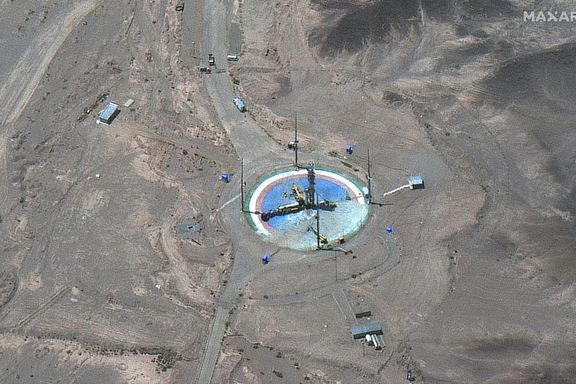
After satellite photos revealed Iran’s preparations for a rocket launch, the country announced Wednesday that it plans two tests for its Zuljanah rocket.

After satellite photos revealed Iran’s preparations for a rocket launch, the country announced Wednesday that it plans two tests for its Zuljanah rocket.
Satellite images from Maxar Technologies showed Tuesday activity at a desert launch pad at Imam Khomeini Space Center southeast of Semnan, prompting Iranian authorities to react and acknowledge plans for tests.
The state-run IRNA news agency quoted Defense Ministry spokesman Ahmad Hosseini as confirming the tests for the new solid-fueled rocket at the site of frequent recent failed attempts to put a satellite into orbit.
He said Iran will launch its satellite-carrying Zuljanah rocket twice more after conducting a previous launch, but he did not elaborate on a timeframe for tests nor said when the previous launch occurred.
Asked about the preparations, State Department spokesman Ned Price told reporters in Washington on Tuesday that the US urges Iran to de-escalate the situation, saying that Iran “has consistently chosen to take provocative actions.”
A Pentagon spokesman, Army Maj. Rob Lodewick, said the American military “will continue to closely monitor Iran’s pursuit of viable space launch technology and how it may relate to advancements in its overall ballistic missile program.” The United States says that space launches by Iran could be a cover to develop intercontinental ballistic missiles that would be able to deliver nuclear warheads.
In March, Iran suffered another failed launch of a satellite-carrying rocket attempting to reinvigorate the program criticized by the West.
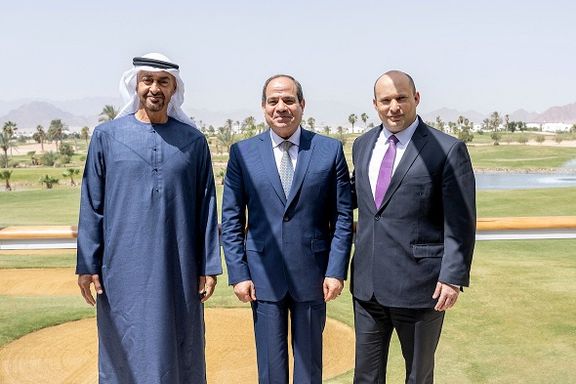
Israel intensified pressure on Iran by calling for a military front with US leadership in the Middle East ahead of a visit to the region by President Joe Biden.
Israel and Arab countries that share its worries about Iran should build up their military capabilities under Washington's aegis, the Israeli defense minister said on Tuesday.
Biden's July 13-16 tour will include Israel, the Palestinian territories and Saudi Arabia, a US official said. According to Saudi state television, Biden will attend a summit with the leaders of Gulf states, Egypt, Jordan and Iraq.
A summit of foreign ministers was held in Israel in March with the participation of the United States, United Arab Emirates, Bahrain, Morocco and Egypt. Israel highlighted the event as a show of unity against Iran.
"This new architecture -- the shared capabilities we are building -- intimidates and deters our common enemies, first and foremost Iran and its proxies," Lapid said alongside his counterparts from the other countries at the Negev summit on March 28.
Iran's nuclear program, and so-far fruitless international negotiations to revive a 2015 deal capping it, are among issues likely to be on the agenda of Biden’s visit and meetings he will held.
In a speech, Defense Minister Benny Gantz cited Israel's security ties with Gulf Arab states that drew closer to it under a 2020 U.S.-sponsored diplomatic drive, as well as Egypt and Jordan, and said there were efforts to expand such cooperation.
"In the face of Iranian belligerence ... what is needed is not just cooperation, but also a regional force build-up, with American leadership, which would strengthen all parties involved," he said, according to an official transcript.
"On this, we are working continually, for the sake of the security of Israel's citizens," Gantz said.
Saudi Arabia signaled its backing for the so-called Abraham Accords under which the United Arab Emirates and Bahrain forged relations with Israel two years ago. But Riyadh has stopped short of formally recognizing neighboring Israel.
Israel has voiced willingness to work militarily with its new Gulf partners, which have been more publicly reticent about such a prospect.
Biden’s visit to the region and specially Saudi Arabia is a major attempt to improve frayed ties with the leading Sunni Arab country in the region, with an eye to boost the kingdom’s oil production in the wake of the Russian invasion of Ukraine and the resulting high fuel prices.
Riyadh and its Arab allies who had close ties with the Trump administration, were concerned with Biden’s policy of restoring the 2015 Iran nuclear agreement and lifting sanction, without provisions to curtail Tehran’s interference in Arab countries and support for militant groups.
Speaking at an event on Tuesday evening, Bennett said Israel "will not hesitate to activate its power anywhere in the world to protect its citizens", alluding to a travel advisory to Istanbul because of what Israel said was a threat of Iranian attempts to kill or abduct vacationing Israelis.
"Israel's security arms are doing everything to thwart such attacks, and to preemptively neutralize those dispatching the terrorists, and the dispatchers’ dispatchers too," Bennett said.
With reporting by Reuters
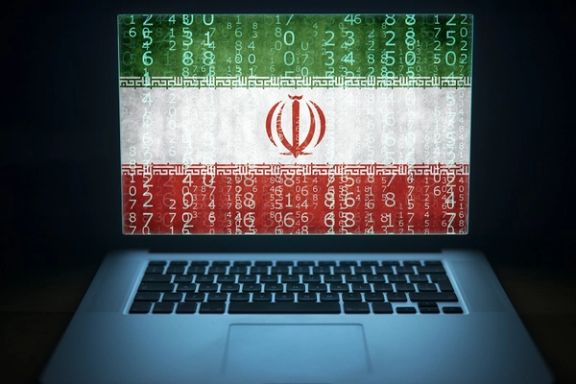
Israel says Iranian hackers broke into the e-mail accounts of senior Israeli officials and carried out targeted "phishing" attacks to retrieve information about politicians and academics.
Israeli cybersecurity company CheckPoint revealed on Tuesday that some of the targets have a high public profile, such as former Foreign Minister Tzipi Livni, the former US ambassador to Israel, and the head of a large security research institute in Israel.
According to CheckPoint, the Iranians who hacked into the e-mail accounts of the officials, impersonated them on various platforms, corresponded on their behalf and eventually stole personal information from them.
The hackers, for instance, used a false identity of a retired Israeli Defense Force general and the former ambassador to Washington in order to approach other officials to continue their breach on the personal information of high-level officials in the defense industry, passports and other restricted documents.
The company added that the hacking campaign began in December of 2021, and continued for at least six months, ending last week.
The ploy was uncovered when Livni approached checkpoint after she became suspicious in December, when she received a mail from the former IDF general who urged her to enter her email password in a Trojan file that had invited her to attend a conference abroad.
In May, Israel’s security agency Shin Bet said it uncovered an alleged plot by Iranian intelligence to lure Israeli academics and former defense officials to travel abroad in order to kidnap them.
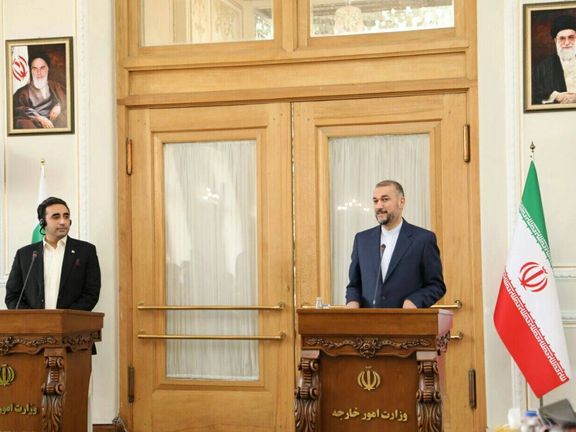
Pakistan’s foreign minister is in Iran and has met with his Iranian counterpart as part of regular high-level exchanges between the two neighbors.
During a joint press conference on Tuesday, Bilawal Bhutto Zardari and Hossein Amir-Abdollahian said they discussed issues of mutual interest such as trade cooperation, border markets, and development of local trade. The top Pakistani diplomat arrived in Tehran for a two-day visit and is scheduled to visit Mashhad on Wednesday.
The two foreign ministers said they also talked about road and rail connectivity and tourism, as well as gas and electricity exports from Iran to Pakistan, adding that they also reviewed regional security issues with a particular focus on developments in Afghanistan and South Asia.
During the press conference, Amir-Abdollahian also touched upon the Vienna talks to restore the 2015 nuclear deal, saying that “Iran has never escaped the negotiating table and we believe that negotiation and diplomacy is the best way to reach agreement.”
The two had met on the sidelines of the World Economic Forum in Davos late in May, calling for bolstering bilateral cooperation. But relations were strained recently over Pakistani allegations of Iranian involvement with a militant separatist group. Among other issues is Islamabad’s challenge to maintain a delicate balance in ties between Iran and Saudi Arabia, whose ties have soured in recent years.
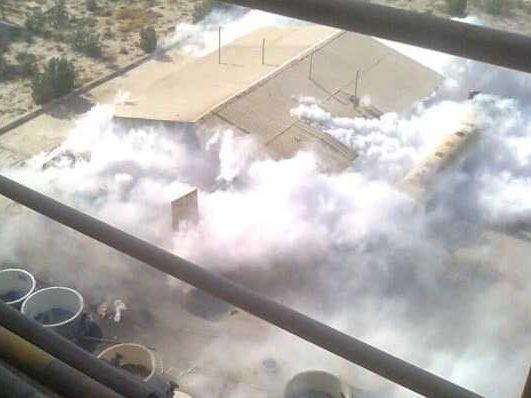
Unconfirmed reports say scores of the workers have reportedly died and many more are injured after an explosion at a chemical factory in southern Iran.
According to reports by Iran’s state media, a leak in an ammonium tank caused a blast Monday evening in the city of Firouzabad in southwestern Fars province but the blaze was quickly extinguished.
The chief of the provincial health department, Vahid Hosseini, claims out of 133 injured who were taken to local hospitals, mostly factory workers, 114 were later released after treatment, but witnesses said in social media that 30 to 70 people have been killed in the accident, some of them instantly.
There are conflicting reports in social media about the cause of the blast, with some saying the tanker was full of nitrogen, not ammonium, hence the high number of casualties.
Director of Fars Governorate Crisis Management Khalil Abdollahi said on Monday night that the accident is being investigated, noting that nobody died.
Authorities reopened a nearby major road that they had closed after the explosion due to the spread of toxic gas.
The factory, which went online in August 2020 with over one thousand workers, is a manufacturer of sodium carbonate, a chemical used to build glass, crystal, detergent, cleaning, water purification and in other petrochemical industries.
Iran occasionally reports fires or explosions at industrial sites that are mainly blamed on technical failures, the result of years of sanctions that have blocked access to new equipment. There have also been many incidents in military sites since mid-2020, with authorities usually blaming Israel.
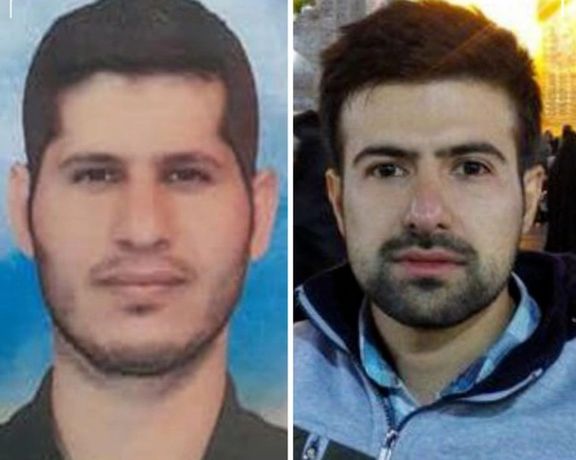
Two IRGC Aerospace Force officers whose deaths were announced Sunday were engaged in "developing arms for Lebanon's Hezbollah," Iran International has learned.
Ali Kamani and Mohammad Abdus, both Revolutionary Guard’s aerospace engineers, "were not killed in accidents" as the Islamic Republic claimed, an informed source told Iran International on Monday.
The two died in separate incidents in two different areas, but the source did not provide further details about the circumstances of their deaths. What was clear from the information received is that the two officers did not die as a result of a car or work place accident.
It is noteworthy that the source emphasized their role in developing weapons for the militant group Hezbollah, which poses a serious threat to Israel with a large arsenal of missiles provided by Iran.
Iranian media first announced that Kamani, a relatively junior officer, died in a “car accident in line of duty” in Khomein, in central Iran.
A few hours later, news came that another aerospace Force officer had also died in the province of Semnan "on lime of duty". Iran's space launch center is located in Semnan. In the reports by the Iranian Media, he was said to be working for the Defense Ministry.
The IRGC aerospace force is tasked with Iran’s missile development and space program. The country has made considerable progress in developing long-range ballistic missiles that can threaten the far fringes of the Middle East, including Israel.
Iran's defense ministry emphasized that both officers died on line of duty and called them “martyrs” without any explanations.
A series of other killings and deaths among IRGC ranks in Iran in recent weeks has led to suspicion that they might have been targets of a secret series of operations, purportedly by Israel’s Mossad.
Considering recent killings of other Revolutionary Guard officers in Iran, some Iranians on social media drew the conclusion that the latest deaths most likely were part of a highly professional anti-IRGC operation carried out with precision.
Last Monday, an Israeli website reported the death of Iranian scientist Kamran Mollapour, who was reportedly working at Natanz nuclear facility in central Iran. This came as conflicting reports were still circulating about the death of Iranian aerospace scientist Ayoob Entezari -- who held a PhD in mechanical and aerospace engineering -- with some calling it an assassination and government saying he died of food poisoning.
The governor-general's office in the central province of Yazd handed a certificate to Entezari's family confirming his "martyrdom", a label the Islamic Republic uses for people who died in the line of duty for the country.
Reports about Entezari’s fate came a day after Iran confirmed the death of a colonel from the Quds Force, Ali Esmailzadeh of the Islamic Revolutionary Guard Corps, the second in two weeks from the unit which allegedly oversees terror operations abroad.
Iranian government and IRGC media said that Col. Esmailzadeh died “in an incident in recent days” at his home without mentioning any details after Iran International quoted sources in Iran as saying that the IRGC killed him over suspicions of espionage. Officials of the Revolutionary Guard told Esmailzadeh’s family that the reason for his death was suicide.
He was a close colleague of Colonel Hassan Sayyad-Khodaei, the acting commander of the elite Qods Unit 840, who was earlier shot dead behind the wheel of his car outside his home in Tehran on May 22 by two gunmen who fled the scene on a motorbike. The sources said that the IRGC became suspicious that Esmailzadeh divulged information about his colleague and decided to eliminate him.